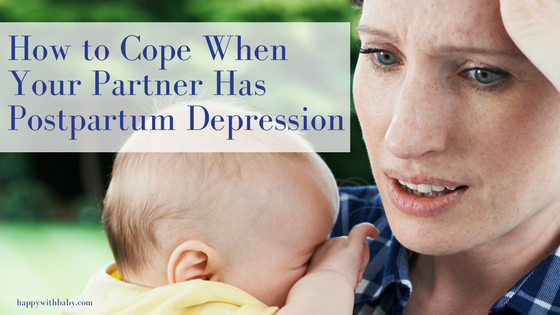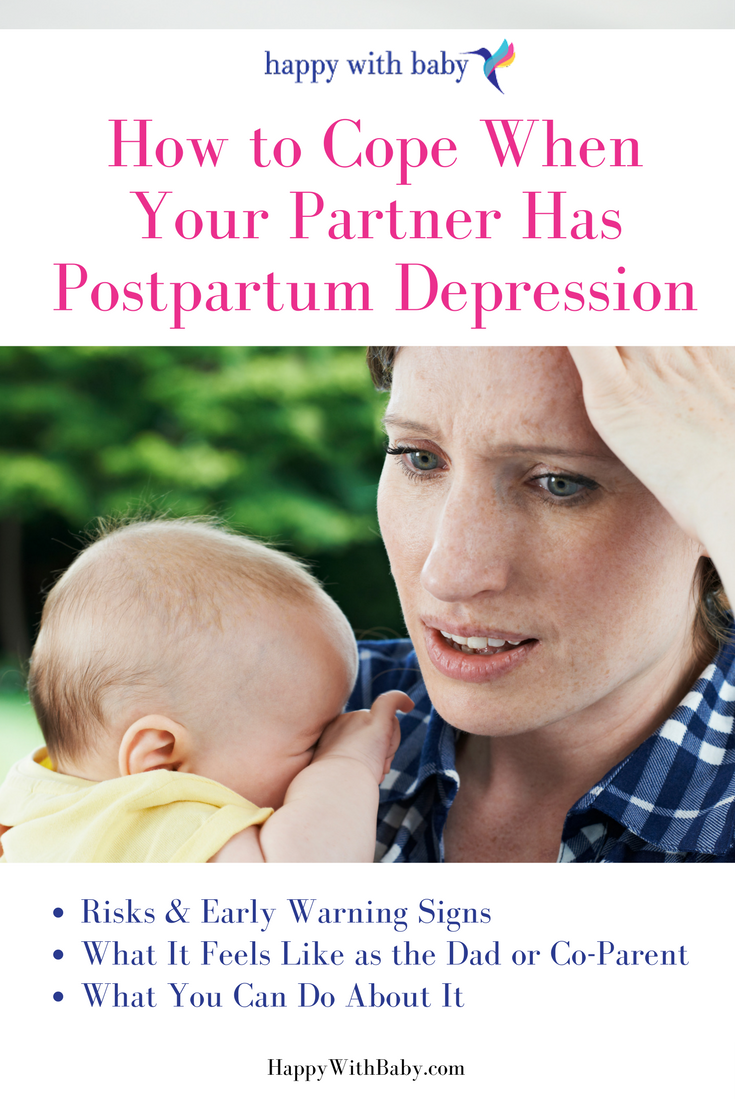How to Cope When Your Partner Has Postpartum Depression

What is it like as a dad or co-parent when your partner has Postpartum Depression or Anxiety?
Well, "difficult" would be an understatement. Imagine you and your partner have the baby you’ve always wanted, but mom is just not herself anymore and you don’t know how to make things better. It can feel helpless or hopeless. It can feel frustrating. You might feel angry or impulsive. Or worried or sad. Or numb. Or way too preoccupied with tending to her needs and feelings that you have no idea how you even feel about it.
This is why it’s so important to have a postpartum plan before the baby arrives to at least give you a framework for dealing with things. This will allow you to be prepared with a list of contacts and a course of action, rather than feeling helpless and unsure of where to even start.
But, postpartum plan or no, if baby is already here and you’re struggling to figure out how to help or what to watch for, I’ve compiled some lists to get you started.
First, you need to know whether your partner is at risk for PPD/A and what the early warning signs are. If you remember nothing else, remember “2 weeks”--this is the window of time where depression is likely just the “baby blues”.
If any of these symptoms last longer than two weeks, your partner might have PPD/A:
-
Dips in mood
-
Frequent crying spells, frequently feeling like bad mom or unhappy with parenthood
-
Loss of interest in things they enjoy
-
Trouble making decisions
-
Isolating yourself socially
-
Having more bad days than good
-
Paranoid or negative thoughts (like baby doesn’t like you)
-
Obsessing over things
-
Constant, or near constant worry (about being a good mom)
-
Restlessness, inability to sleep, or wanting to sleep all the time
-
Thoughts of suicide or hurting baby (pp psychosis, not depression) National Suicide Prevention Lifeline at 800-273-8255 immediately to get help.
-
According to Pacific Post Partum Support Society, about 10% of dads and co-parents will experience PPD themselves, and if mom/birth parent is experiencing PPD, that percentage can jump to 25-50%.
There are a few things that put your partner at an increased risk for PPD/A, but also know that there really is no predictor or guarantee that your partner will or won’t have it after baby arrives. (In fact, even if your partner had PPD/A with your first child, that doesn’t mean she’ll have it with your second.) The only way to know is to watch for signs and get a diagnosis after baby is born.

That said, these things can put your partner at increased risk for PPD/A:
-
A history of depression
-
Family history
-
Relationship conflict or uncertainty
-
Other trauma or adversity (such as a recent death of a loved one or one of the partners losing his/her job) that compounds the stresses of pregnancy/parenthood
If you think your partner is suffering from PPD/A, here are some ways you can be supportive:
-
Know the signs and pay attention
-
Have numbers of professionals handy (midwife, doula, OB or pediatrician, childbirth educator, psychotherapist) and reach out for help
-
Offer to help with the baby more. Give her an afternoon off so she can go be with friends or get outdoors.
-
People often chip in to help during the first few weeks, but when that help begins to trail off, find ways to pick up the slack: Take on more chores yourself, talk to her friends, or hire help.
-
Listen to her and try to understand how she feels, but remind her that she’s going through a lot of change and she’s not a bad mom for it.
-
Offer to go to doctor appointments with her.
-
Make sure she’s eating.
-
Be communicative with her: let her know when you plan to be home and be home on time, tell her how you’re feeling and that you are listening. Don’t distance yourself, but do ask if you can press pause on the conversation if things get too heated. Just make sure to come back to it later when you both are more calm.
-
Talk to her closest friends and tell them you think she’s dealing with PPD
-
If she’s not aware she’s got PPD, you may have to find a way to gently confront the issue. She might feel defensive, but it’s better to deal with it than stay silent and keep her in her suffering.
-
Extra sleep won’t necessarily cure PPD, but if she’s sleep deprived, it can exacerbate it. Offer to watch the baby so she can catch up on some zzzzzz’s
-
Google support groups for her. A great place to start would be inquiring at your birth hospital. If they don’t have their own support groups, they’ll likely have a list of resources available.
-
Offer to go to couples therapy with her.
Ways you can get the support you need as a Dad or Co-Parent:
-
Find support groups for dads or parenting partners.
-
Consider therapy, if not as a couple, then just for yourself.
-
Make sure you get time for yourself. You can’t pour from an empty glass. Your partner needs to rely on you, and that means you need to make sure you’re taking care of yourself. This includes getting time alone, time with friends, time for exercise, etc.
-
Do spend extra time with your baby so that you can develop your confidence as a parent.
-
Make sure you are paying attention to how you feel. It’s easy to get so caught up in what your partner is going through that you don’t even notice that you’re depressed yourself.
-
Talk to other dads and co-parents about their experiences.
-
See what your options are for parental or family leave, or use some vacation days to take time off.
-
Know that you can’t fix everything. Things will go wrong. You’re not superhuman. Let yourself off the hook now and then.
Subscribe
Sign up to get the latest weekly blogs sent straight to your inbox


0 comments
Leave a comment
Please log in or register to post a comment